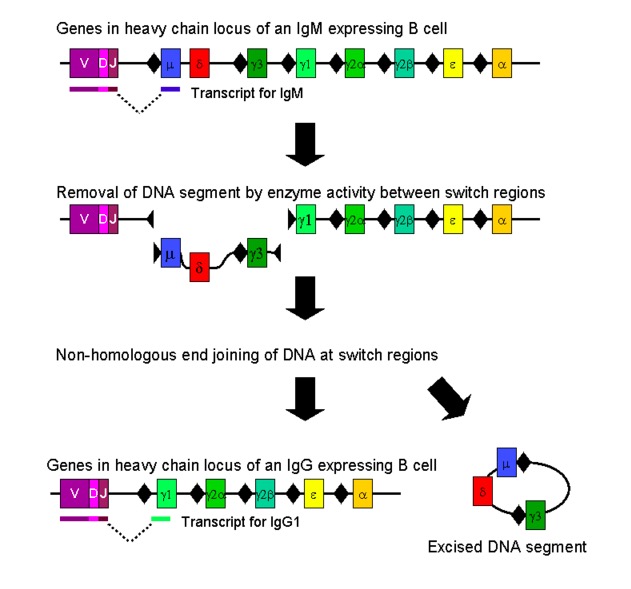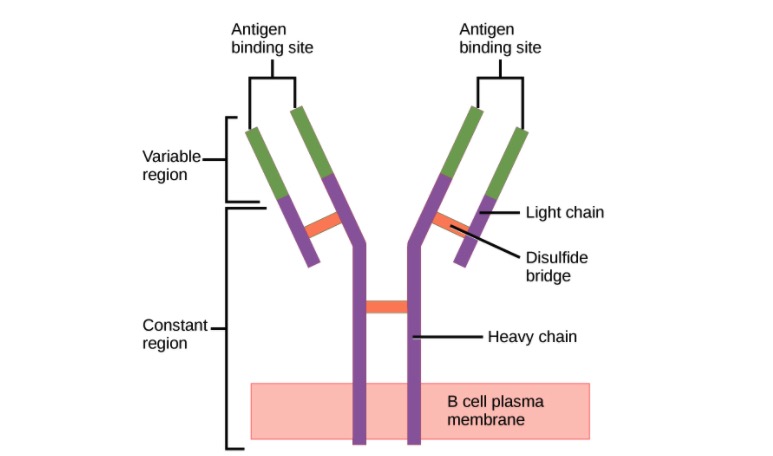Playlist
Show Playlist
Hide Playlist
Humoral Immunity: Function of Antibodies
-
08 Slides Humoral Immunity.pdf
-
Download Lecture Overview
00:01 Let’s now turn to what antibodies actually do. 00:04 We’ve looked a little bit at their structure, but how do they actually function to protect us from all the different nasty pathogens that we’re encountering all the time - bacteria, viruses, fungi, parasites. 00:17 Well antibody can actually function totally alone, just work completely by itself to combat pathogenic situations. 00:28 So for example, it can bind to bacterial toxins and neutralize those toxins. 00:34 Stop those toxins poisoning our cells. 00:38 It can block viruses binding to their cellular receptors. 00:42 In order to enter a cell, a virus has to bind to the surface of one of our cells. 00:47 If an antibody gets in the way, the virus can’t bind. 00:52 Or antibodies can block adherence of bacteria to mucosal surfaces. 00:58 And secretory IgA is really good at doing that. 01:02 So these are three examples of antibody not needing to draw on help from other parts of the immune system. 01:09 They can do all this stuff completely on their own. 01:13 But most times, antibody acts as a bridge between the antigen and other components of the immune system. 01:21 So let us look at the ways in which this occurs. 01:24 So looking at the variety of ways in which antibodies recruit other components of the immune response, one important way is using red blood cells to facilitate the clearance of immune complexes. 01:38 We tend to think of red blood cells as transporting oxygen around the body and really perhaps not much to do with the immune response. 01:44 But like most cells in the body, red blood cells have more than one function. 01:50 And they have on their cell surface, complement receptors. 01:54 And this means they can pick up immune complexes of antigen and antibody and complement. 02:00 And they bind those complexes and take the immune complexes to places like the liver and the spleen where there are lots of phagocytic macrophages that can take up the immune complexes and destroy the pathogen or substances within the immune complex. 02:18 And the IgM and IgG class of antibody are really good at doing this because they can activate complement via the classical pathway. 02:26 Microorganisms often need to be opsonized, coated with substances that maximize their phagocytic uptake. 02:35 And antibodies are good at opsonizing microorganisms for phagocytosis. 02:41 And the IgG class of antibody is really good at doing that. 02:46 A third mechanism, where antibodies function to link other parts of the immune response into the protective activity, is antibody-dependant cellular cytotoxicity - ADCC. 03:01 This relies upon a cell having two features. 03:07 Firstly, it needs to have an Fc receptor, and secondly, it needs to be able to produce toxic molecules. 03:16 And in fact most cells in the immune system have both Fc receptors, and are able to produce toxic molecules. 03:23 So, most cells in the immune response can actually participate in ADCC. 03:28 With regards to the class of antibody that is best mediating this process, IgG again is really good at doing this. And the result will be that the cell participating in this process will release toxic molecules that will destroy the coated organism. The generation of a membrane attack complex of complement is an important mechanism for destruction of microorganisms. 04:01 And this involves activation of the complement system by antibody. 04:06 And the two class of antibody that are good at doing this is the IgM and IgG antibody classes. 04:15 And this will lead to the generation of a membrane attack complex, consisting of complement component C5b, C6, C7, C8, C9. 04:25 And this will lead to the death of the cell. 04:30 And then finally, mast cell degranulation is an important mechanism for dealing with certain parasites. 04:38 And the IgE class of antibody is specialized for carrying out this particular function. 04:45 So you see, we have a range of different antibody classes, and they can participate in a variety of ways to recruit other cellular or molecular components of the immune response to help protect against pathogens. 05:01 Looking now at the individual antibody classes and their specialization for different functions, there’s a reason why we have five different classes, because to some extent they have specialized functions. 05:13 There is a certain overlap in their functions. 05:15 But broadly speaking, IgM facilitates the recognition of antigen by B-cells because it acts as the B-cell receptor together with IgD on the surface of naïve B-cells. 05:29 The secreted version of IgM is mainly present in the circulation. 05:33 We saw that it’s a pentamer, five units of antibody linked together. 05:37 That makes it a very large antibody molecule. 05:40 So it can’t easily get out of the circulation and into the tissues. 05:44 But it’s present mostly in the circulation where it is the first antibody class that is produced in adaptive responses. 05:53 So those naïve B-cells will go on, and before class switching produce lots of IgM. 05:58 It’s good at activating complement as we’ve already heard, and it can also agglutinate bacteria together, because it’s got 10 antigen binding arms. 06:06 It’s a pentamer, so it’s able to link together microorganisms. 06:11 This is a very good way, this agglutination of microorganisms is a very good way of combating bacterial infections. IgG is the most abundant antibody in the circulation. It can activate complement, it can enhance phagocytosis by opsonization. It can participate in antibody dependant cellular cytotoxicity, is able to directly neutralize some pathogens, and uniquely amongst the five classes, it can cross the placenta. It’s very important in protecting the fetus from infections. The mom will pass IgG against pathogens she’s encountering. She’ll pass it across the placenta, and the baby will benefit enormously from this, because at the time we’re born, our B-cells are only just beginning to be able to make their own antibody. So this antibody coming from the mom is very important. And it’s only the IgG class that is able to cross the placenta. The secretory form of IgA prevents colonization at mucosal surfaces. IgD acts together with IgM as the B-cell receptor on naïve B-cells. 07:26 And IgE in the presence of antigen triggers the release of inflammatory mediators from mast cells and basophils. 07:35 So you see, we have five different classes of antibody because at least to some extent, they’re specialized to carry out different activities. 07:44 Although there is a certain overlap. 07:47 For example, both IgM and IgG can activate the classical pathway of complement.
About the Lecture
The lecture Humoral Immunity: Function of Antibodies by Peter Delves, PhD is from the course Humoral Immunity and Cell-mediated Immunity. It contains the following chapters:
- The Function of Antibodies
- Summary of Antibody Function
Included Quiz Questions
Which of the following 2 isotypes of antibodies are most efficient in activating the classical complement pathway?
- IgM and IgG
- IgG and IgD
- IgD and IgA
- IgA and IgE
- IgE and IgM
Antibodies contribute to the immune system response in all of the following ways EXCEPT?
- Free radical generation
- Opsonization
- Neutralization
- Prevention of the adherence of pathogens to the mucosa
Which of the following is one way red blood cells complement the function of circulating antibodies?
- By binding and transporting immune complexes to sites of destruction
- Via phagocytosis of immune complexes
- By secreting cytokines
- Via mast cell degranulation
- By generating the membrane attack complex
Which of the following antibody classes crosses the placenta in significant amounts?
- IgG
- IgM
- IgA
- IgE
- IgD
Customer reviews
5,0 of 5 stars
| 5 Stars |
|
2 |
| 4 Stars |
|
0 |
| 3 Stars |
|
0 |
| 2 Stars |
|
0 |
| 1 Star |
|
0 |
So easy to understand and memorize! Lecturio has been an amazing tool for my medical education, namely these lectures.
The lecturer made the key points very easy to remember!





